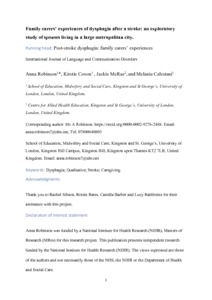Robinson, A; Coxon, K; McRae, J; Calestani, M
(2022)
Family carers' experiences of dysphagia after a stroke: An exploratory study of spouses living in a large metropolitan city.
Int J Lang Commun Disord, 57 (5).
pp. 924-936.
ISSN 1460-6984
https://doi.org/10.1111/1460-6984.12724
SGUL Authors: McRae, Jacqueline
![[img]](https://openaccess.sgul.ac.uk/114635/6.hassmallThumbnailVersion/Calestani-M-51480-AAM.pdf)  Preview |
|
PDF
Accepted Version
Available under License ["licenses_description_publisher" not defined].
Download (434kB)
| Preview
|
Abstract
BACKGROUND: People with post-stroke dysphagia often require informal care from family to facilitate safe swallowing, modify food/drink or administer tube-feeds. Previous survey studies have found dysphagia may increase family caregiver burden. However, the experiences of family members in this population have not been fully explored. AIMS: To explore family members' experiences of living with a spouse with post-stroke dysphagia. METHODS & PROCEDURES: This exploratory qualitative study used one-to-one semi-structured interviews to explore family members' experiences. They were asked open questions about previous eating routines, dysphagia onset, their role and future hopes. Interviews were audio-recorded, transcribed and analysed thematically with an inductive approach to determine key features of family members' experiences. OUTCOMES & RESULTS: Five spouses aged 70-93 years participated. Their relatives' strokes happened 3 months to 3 years before the interview. Five themes were identified: 'I do all of it'; making sense of dysphagia; emotional responses; reflecting on relationships; and redefining lifestyle. CONCLUSIONS & IMPLICATIONS: It is important to consider family members' perspectives as they often provide vital care to loved-ones with dysphagia. In relation to eating and drinking, maintaining elements of previous routines seems important to families. Healthcare professionals should consider these when making recommendations for rehabilitation. Family members have differing perspectives of the comparative impact of dysphagia; patient and family priorities should be explored for healthcare professionals to provide better-targeted support. WHAT THIS PAPER ADDS: What is already known on the subject Informal caregivers, often spouses, play a vital role in supporting the health and well-being of older people with health conditions. The presence of post-stroke dysphagia may present increased challenges for the informal caregiver. There are limited studies qualitatively exploring the experiences of informal caregivers in this population. What this paper adds to existing knowledge Current health and social care provision for this population leaves informal caregivers feeling they have been left to manage dysphagia alone. Informal caregivers demonstrate a breadth of knowledge about their spouse's dysphagia, problem-solving effective solutions. Informal caregivers have a range of interpretations of the nature and cause of dysphagia; leading to miscommunication with health professionals and complex emotional responses. What are the potential or actual clinical implications of this work? Healthcare professionals might consider ways in which to support dysphagic patients' families later in their care pathway, through scheduling reviews or running dysphagia patient and family groups. Health and social care professionals and policymakers should learn from informal caregivers' expertise to promote better health and quality-of-life outcomes for the patient and caregiver. Equal, open conversations between health and social care professionals and patients/families on their understanding of dysphagia may help informal caregivers to better voice their concerns and support mutual understanding. This has implications for adherence to recommendations, psychological well-being and patient safety.
| Item Type: |
Article
|
| Additional Information: |
This is the peer reviewed version of the following article: Robinson, A., et al. (2022) Family carers’ experiences of dysphagia after a stroke: An exploratory study of spouses living in a large metropolitan city. International Journal of Language & Communication Disorders, 57, 924– 936, which has been published in final form at https://doi.org/10.1111/1460-6984.12724. This article may be used for non-commercial purposes in accordance with Wiley Terms and Conditions for Use of Self-Archived Versions. This article may not be enhanced, enriched or otherwise transformed into a derivative work, without express permission from Wiley or by statutory rights under applicable legislation. Copyright notices must not be removed, obscured or modified. The article must be linked to Wiley’s version of record on Wiley Online Library and any embedding, framing or otherwise making available the article or pages thereof by third parties from platforms, services and websites other than Wiley Online Library must be prohibited. |
| Keywords: |
caregiving, dysphagia, qualitative, stroke, caregiving, dysphagia, qualitative, stroke, 1103 Clinical Sciences, 1702 Cognitive Sciences, 2004 Linguistics, Speech-Language Pathology & Audiology |
| SGUL Research Institute / Research Centre: |
Academic Structure > Institute of Medical, Biomedical and Allied Health Education (IMBE) |
| Journal or Publication Title: |
Int J Lang Commun Disord |
| ISSN: |
1460-6984 |
| Language: |
eng |
| Publisher License: |
Publisher's own licence |
| PubMed ID: |
35438234 |
| Web of Science ID: |
WOS:000783528300001 |
| Dates: |
| Date |
Event |
| 2022-09-23 |
Published |
| 2022-04-19 |
Published Online |
| 2022-03-11 |
Accepted |
|
 |
Go to PubMed abstract |
| URI: |
https://openaccess.sgul.ac.uk/id/eprint/114635 |
| Publisher's version: |
https://doi.org/10.1111/1460-6984.12724 |
Statistics
Item downloaded times since 31 Aug 2022.
Actions (login required)
 |
Edit Item |



